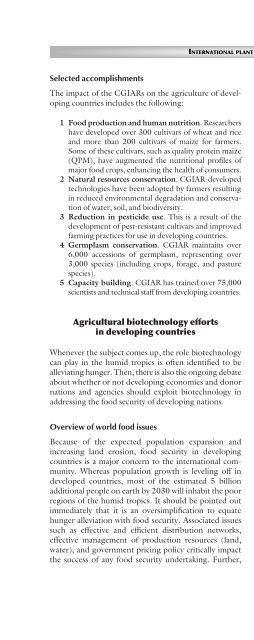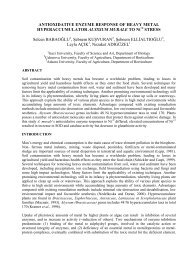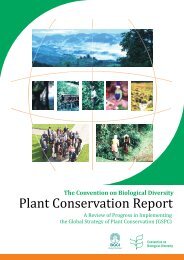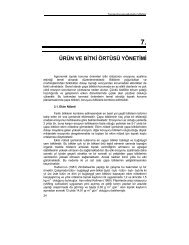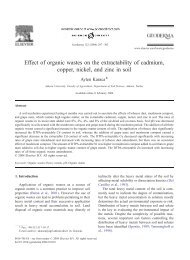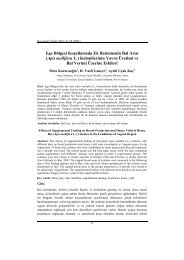Principles of Plant Genetics and Breeding
Principles of Plant Genetics and Breeding
Principles of Plant Genetics and Breeding
Create successful ePaper yourself
Turn your PDF publications into a flip-book with our unique Google optimized e-Paper software.
Selected accomplishments<br />
The impact <strong>of</strong> the CGIARs on the agriculture <strong>of</strong> developing<br />
countries includes the following:<br />
1 Food production <strong>and</strong> human nutrition. Researchers<br />
have developed over 300 cultivars <strong>of</strong> wheat <strong>and</strong> rice<br />
<strong>and</strong> more than 200 cultivars <strong>of</strong> maize for farmers.<br />
Some <strong>of</strong> these cultivars, such as quality protein maize<br />
(QPM), have augmented the nutritional pr<strong>of</strong>iles <strong>of</strong><br />
major food crops, enhancing the health <strong>of</strong> consumers.<br />
2 Natural resources conservation. CGIAR-developed<br />
technologies have been adopted by farmers resulting<br />
in reduced environmental degradation <strong>and</strong> conservation<br />
<strong>of</strong> water, soil, <strong>and</strong> biodiversity.<br />
3 Reduction in pesticide use. This is a result <strong>of</strong> the<br />
development <strong>of</strong> pest-resistant cultivars <strong>and</strong> improved<br />
farming practices for use in developing countries.<br />
4 Germplasm conservation. CGIAR maintains over<br />
6,000 accessions <strong>of</strong> germplasm, representing over<br />
3,000 species (including crops, forage, <strong>and</strong> pasture<br />
species).<br />
5 Capacity building. CGIAR has trained over 75,000<br />
scientists <strong>and</strong> technical staff from developing countries.<br />
Agricultural biotechnology efforts<br />
in developing countries<br />
Whenever the subject comes up, the role biotechnology<br />
can play in the humid tropics is <strong>of</strong>ten identified to be<br />
alleviating hunger. Then, there is also the ongoing debate<br />
about whether or not developing economies <strong>and</strong> donor<br />
nations <strong>and</strong> agencies should exploit biotechnology in<br />
addressing the food security <strong>of</strong> developing nations.<br />
Overview <strong>of</strong> world food issues<br />
Because <strong>of</strong> the expected population expansion <strong>and</strong><br />
increasing l<strong>and</strong> erosion, food security in developing<br />
countries is a major concern to the international community.<br />
Whereas population growth is leveling <strong>of</strong>f in<br />
developed countries, most <strong>of</strong> the estimated 5 billion<br />
additional people on earth by 2030 will inhabit the poor<br />
regions <strong>of</strong> the humid tropics. It should be pointed out<br />
immediately that it is an oversimplification to equate<br />
hunger alleviation with food security. Associated issues<br />
such as effective <strong>and</strong> efficient distribution networks,<br />
effective management <strong>of</strong> production resources (l<strong>and</strong>,<br />
water), <strong>and</strong> government pricing policy critically impact<br />
the success <strong>of</strong> any food security undertaking. Further,<br />
INTERNATIONAL PLANT BREEDING EFFORTS 459<br />
food security in these economically disadvantaged areas<br />
is intertwined inextricably with disease <strong>and</strong> environmental<br />
degradation. Poor soils <strong>and</strong> poor production<br />
management result in low crop yield, malnutrition, <strong>and</strong><br />
a variety <strong>of</strong> health issues. Some observe that the medical<br />
problems <strong>of</strong> Africa are inseparable from the <strong>of</strong> lack <strong>of</strong><br />
food. Needless to say that tackling third world food<br />
security is a challenging proposition that requires careful<br />
planning <strong>and</strong> an integrated approach.<br />
Promotion <strong>of</strong> agricultural biotechnology in developing<br />
economies should be accompanied by a promotion<br />
<strong>of</strong> improved agricultural practices. This way, the ecological<br />
limits <strong>of</strong> population growth can be exp<strong>and</strong>ed by<br />
utilizing existing farml<strong>and</strong> more productively <strong>and</strong> also<br />
by improving crop harvests. It has been pointed out by<br />
some experts that the current agricultural biotechnologies<br />
do not increase the productivity per se <strong>of</strong> plants.<br />
Instead, they lower pre- <strong>and</strong> postharvest losses by up to<br />
25%. In terms <strong>of</strong> strategy, it is suggested that in view <strong>of</strong><br />
the problems with food distribution <strong>and</strong> local environments,<br />
agriculture in the humid tropics must be indigenous<br />
<strong>and</strong> very productive. Consequently, the infusion <strong>of</strong><br />
foreign technologies must proceed cautiously. Further,<br />
the technology <strong>of</strong> gene transfer must be developed in<br />
situ, at least in some <strong>of</strong> the tropical developing countries,<br />
to ensure that it responds to local conditions. This<br />
strategy will also ensure that the technology is more<br />
readily acceptable to the local government, the local<br />
scientific community, plant breeders, <strong>and</strong> also the local<br />
population.<br />
Biotechnology is very capital <strong>and</strong> knowledge intensive.<br />
Such commitments are woefully inadequate in many<br />
developing economies. However, because the private<br />
sector plays a dominant role in setting biotechnology<br />
research <strong>and</strong> development targets, <strong>and</strong> because economic<br />
returns on investment is critical to investors,<br />
crops that benefit developing countries receive little<br />
attention because they are <strong>of</strong> little commercial interest.<br />
Consequently, the talk <strong>of</strong> improving tropical crops falls<br />
to other agencies (e.g., the United Nations) where there<br />
is little pressure to make pr<strong>of</strong>it. The need to infuse<br />
biotechnology into the agriculture <strong>of</strong> developing countries<br />
is further underscored by the fact that most <strong>of</strong> these<br />
countries have agricultural-based economies. Improving<br />
agriculture is hence a major avenue for improving such<br />
economies. The productivity potential <strong>of</strong> the major<br />
food crops <strong>of</strong> the developing world is far from being<br />
attained. Doubling the current level <strong>of</strong> productivity <strong>of</strong><br />
staple food crops will make a significant impact on the<br />
food security <strong>of</strong> these nations.


